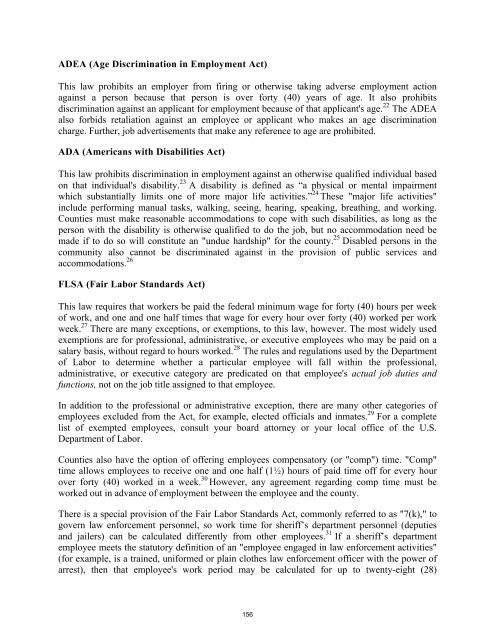in Mississippi
m2078-county-gov-ms
m2078-county-gov-ms
Create successful ePaper yourself
Turn your PDF publications into a flip-book with our unique Google optimized e-Paper software.
ADEA (Age Discrim<strong>in</strong>ation <strong>in</strong> Employment Act)<br />
This law prohibits an employer from fir<strong>in</strong>g or otherwise tak<strong>in</strong>g adverse employment action<br />
aga<strong>in</strong>st a person because that person is over forty (40) years of age. It also prohibits<br />
discrim<strong>in</strong>ation aga<strong>in</strong>st an applicant for employment because of that applicant's age. 22 The ADEA<br />
also forbids retaliation aga<strong>in</strong>st an employee or applicant who makes an age discrim<strong>in</strong>ation<br />
charge. Further, job advertisements that make any reference to age are prohibited.<br />
ADA (Americans with Disabilities Act)<br />
This law prohibits discrim<strong>in</strong>ation <strong>in</strong> employment aga<strong>in</strong>st an otherwise qualified <strong>in</strong>dividual based<br />
on that <strong>in</strong>dividual's disability. 23 A disability is def<strong>in</strong>ed as “a physical or mental impairment<br />
which substantially limits one of more major life activities.” 24 These "major life activities"<br />
<strong>in</strong>clude perform<strong>in</strong>g manual tasks, walk<strong>in</strong>g, see<strong>in</strong>g, hear<strong>in</strong>g, speak<strong>in</strong>g, breath<strong>in</strong>g, and work<strong>in</strong>g.<br />
Counties must make reasonable accommodations to cope with such disabilities, as long as the<br />
person with the disability is otherwise qualified to do the job, but no accommodation need be<br />
made if to do so will constitute an "undue hardship" for the county. 25 Disabled persons <strong>in</strong> the<br />
community also cannot be discrim<strong>in</strong>ated aga<strong>in</strong>st <strong>in</strong> the provision of public services and<br />
accommodations. 26<br />
FLSA (Fair Labor Standards Act)<br />
This law requires that workers be paid the federal m<strong>in</strong>imum wage for forty (40) hours per week<br />
of work, and one and one half times that wage for every hour over forty (40) worked per work<br />
week. 27 There are many exceptions, or exemptions, to this law, however. The most widely used<br />
exemptions are for professional, adm<strong>in</strong>istrative, or executive employees who may be paid on a<br />
salary basis, without regard to hours worked. 28 The rules and regulations used by the Department<br />
of Labor to determ<strong>in</strong>e whether a particular employee will fall with<strong>in</strong> the professional,<br />
adm<strong>in</strong>istrative, or executive category are predicated on that employee's actual job duties and<br />
functions, not on the job title assigned to that employee.<br />
In addition to the professional or adm<strong>in</strong>istrative exception, there are many other categories of<br />
employees excluded from the Act, for example, elected officials and <strong>in</strong>mates. 29 For a complete<br />
list of exempted employees, consult your board attorney or your local office of the U.S.<br />
Department of Labor.<br />
Counties also have the option of offer<strong>in</strong>g employees compensatory (or "comp") time. "Comp"<br />
time allows employees to receive one and one half (1½) hours of paid time off for every hour<br />
over forty (40) worked <strong>in</strong> a week. 30 However, any agreement regard<strong>in</strong>g comp time must be<br />
worked out <strong>in</strong> advance of employment between the employee and the county.<br />
There is a special provision of the Fair Labor Standards Act, commonly referred to as "7(k)," to<br />
govern law enforcement personnel, so work time for sheriff’s department personnel (deputies<br />
and jailers) can be calculated differently from other employees. 31 If a sheriff’s department<br />
employee meets the statutory def<strong>in</strong>ition of an "employee engaged <strong>in</strong> law enforcement activities"<br />
(for example, is a tra<strong>in</strong>ed, uniformed or pla<strong>in</strong> clothes law enforcement officer with the power of<br />
arrest), then that employee's work period may be calculated for up to twenty-eight (28)<br />
156


